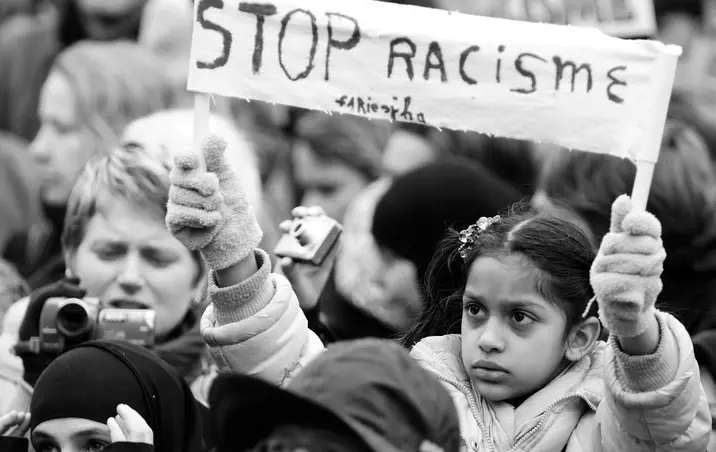The Recent Rise in Racism Against Indians in America: A Dangerous Trend Fuelled by Fringe Extremists
Indians in the U.S.A. are now increasingly being subjected to derogatory comments, disinformation campaigns, and coordinated online harassment.

Protest against racism.
In recent weeks, Indians in the United States have become prominent targets of hate, facing a surge in racist attacks from fringe alt-right factions of President-elect Donald Trump’s base. This troubling trend has also escalated significantly online, especially on Elon Musk’s X (formerly Twitter), where controversial moderation policies and platform changes have emboldened extremist voices.
It all began with a major debate over the H-1B visas and President-elect Donald Trump’s decision to appoint an Indian-born entrepreneur and venture capitalist Sriram Krishnan as his adviser on artificial intelligence.
This stance has now created a rift between Trump and some of his more hardline supporters. Musk, who himself once held an H-1B visa, has been vocal on the issue, stating his commitment to "fight" for the program and noting that Tesla secured 724 H-1B visas this year alone.
The H-1B visa serves as a temporary work authorization, typically valid for three years, with options for renewal or transition to permanent residency through a green card. However, the program is limited by an annual cap of 85,000 visas, most of which are granted for computer-related professions, an area where Indian workers play a significant role.
While Trump previously sought to restrict the H-1B program during his first term, he recently acknowledged its value, saying, "I have many H-1B visas on my properties. I've always believed in the program and used it frequently. It's excellent."
This dispute has drawn battle lines between Musk, alongside entrepreneur and fellow Trump advocate Vivek Ramaswamy, and hardline MAGA figures such as far-right activist Laura Loomer and former congressman Matt Gaetz, who was once being considered for the role of attorney general.
In what some are describing as the beginnings of a "MAGA civil war," Musk launched a strong defence after Loomer criticized the selection of Krishnan, a Silicon Valley venture capitalist, as a troubling choice for shaping the administration AI policy. Soon after her remarks went viral, the fringe alt right elements of Trump’s base joined in, and ever since it has been an endless barrage of racist remarks coupled with bigotry and xenophobia.
Indians in the U.S., a successful community known for its contributions across technology, medicine, academia, and other fields, are now increasingly being subjected to derogatory comments, disinformation campaigns, and coordinated online harassment.
These malicious attacks often target individuals’ cultural identity, religion, and immigration status, exploiting stereotypes to fuel division and resentment. Several high-profile incidents have highlighted the issue. Indian-origin professionals, particularly in the tech industry, have been falsely accused of "stealing jobs" or undermining "American culture."
Others have been scapegoated for geopolitical tensions involving India. This bigotry filledrhetoric frequently extends beyond online spaces, raising concerns about its potential to incite real-world violence.
Since Elon Musk’s takeover of X, the platform had already undergone significant changes, including the dismantling of key content moderation teams and the reinstatement of previously banned accounts.
While Musk had defended these moves as steps toward free speech, critics have argued thatthey have created an environment where hate speech and disinformation flourish unchecked. Fringe alt-right groups have exploited the platform’s relaxed policies, amplifying their messages and coordinating harassment campaigns.
Indian-origin users have reported an uptick in targeted abuse, ranging from offensive memes to direct threats. This toxic climate has left many feeling unsafe online and disillusioned with platforms that fail to protect marginalized voices.
The rise in racism against Indians is part of a larger pattern of xenophobia and white nationalism gaining traction in certain circles. Such attacks not only harm individuals but also erode the social fabric by fostering division and distrust. They undermine efforts to build inclusive communities and create a chilling effect on minority groups who fear backlash for simply being visible online.
The rise in racism against Indians in the U.S. is a stark reminder of the dangers posed by unchecked hate speech on social media. While platforms like X have the power to connect people and foster dialogue, they also bear a responsibility to ensure these spaces are not weaponized to harm vulnerable communities. It’s time for tech leaders, policymakers, and society at large to come together to combat this alarming trend before it escalates further.
